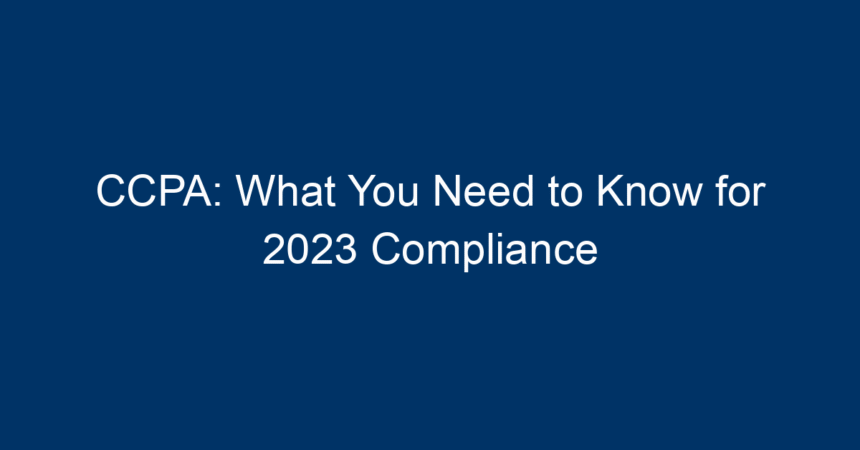Introduction
As data privacy continues to become a pressing concern for consumers and businesses alike, the California Consumer Privacy Act (CCPA) stands as a pivotal piece of legislation. Introduced in 2018 and fully enforced since January 2020, the CCPA sets rigorous rules for how businesses collect, store, and use personal information. With 2023 well underway, understanding the nuances of CCPA compliance has never been more essential for businesses operating in California or those that interact with California residents. In this article, we’ll dissect the key elements of the CCPA, outline the compliance requirements for 2023, and provide actionable insights to ensure your business is aligned with the law.
What is the CCPA?
The California Consumer Privacy Act is designed to protect the personal information of California residents. It grants consumers several rights, including the right to know what personal data is being collected, the right to have that data deleted, and the right to opt out of the sale of their personal information. The CCPA applies to businesses that meet specific criteria, including having annual gross revenues of over $25 million, collecting personal data for commercial purposes, or sharing personal data of 50,000 or more consumers annually.
Key Definitions
Understanding key definitions is crucial for CCPA compliance:
- Personal Information: Any data that relates to a person or household, including names, addresses, email addresses, and even commercial information.
- Business: Any for-profit entity that collects personal information from consumers, does business in California, and meets the revenue threshold.
- Consumer: A resident of California who is an individual and not acting on behalf of any entity.
Who Must Comply with the CCPA?
Not all businesses are subject to the CCPA. Companies must fulfill at least one of the following conditions:
- Annual Revenue: Businesses with annual gross revenues exceeding $25 million.
- Data Collection Volume: Entities that buy, sell, or share the personal information of 50,000 or more consumers, households, or devices annually.
- Substantial Revenue from Selling Data: Businesses that earn more than half of their annual revenue from selling consumers’ personal information.
For businesses that fall into these categories, compliance is not optional; it’s a legal obligation.
Key CCPA Compliance Requirements
1. Transparency in Data Collection
One of the foundational principles of the CCPA is transparency. Businesses must inform consumers about the categories of personal information collected, the purposes for which it is used, and whether it is sold or shared with third parties. This information should be readily available on a company’s website, usually in a privacy policy.
2. Consumer Rights
The CCPA empowers consumers with several rights regarding their personal data. Businesses must establish processes to honor these rights, which include:
- The Right to Know: Consumers can request information about the categories and specific pieces of personal data that a company collects about them.
- The Right to Delete: Consumers can request the deletion of their personal data, and businesses must comply unless an exception applies.
- The Right to Opt-Out: Consumers have the right to opt out of the sale of their personal information. Businesses are required to provide a ‘Do Not Sell My Personal Information’ link on their website to facilitate this process.
3. Implementation of a Compliance Program
To ensure compliance, businesses should implement a data privacy program that includes:
- Training for Employees: Educating employees about CCPA requirements and their roles in maintaining compliance.
- Data Inventory: Conducting a comprehensive inventory of personal information to understand what data is collected and how it is used.
- Incident Response Plan: Developing a robust plan to address data breaches, including notifying affected consumers as required by the CCPA.
4. Updating Privacy Policies
Your business’s privacy policy must be updated to reflect CCPA requirements. This includes adding information about consumer rights, detailing the data you collect, and clarifying the purposes for its use. Ensure the policy is easily accessible and intelligible for consumers.
Challenges in CCPA Compliance
1. Complexity of Data Handling
For many businesses, keeping track of data flows can quickly become complex. Understanding where data is sourced, how it is processed, and whether it is shared or sold is critical yet challenging.
2. Keeping Up with Regulations
California’s CCPA is not static; it evolves. Amendments, such as the California Privacy Rights Act (CPRA), which enhances privacy protections, have been added. Keeping up with these changes is essential for ongoing compliance.
3. Consumer Trust
Many consumers remain skeptical about how their data is handled. Building and maintaining trust through transparent data practices is not just a legal requirement but also essential for brand equity.
Actionable Insights for CCPA Compliance in 2023
1. Conduct a CCPA Compliance Assessment
Start the year by evaluating your current compliance status. Identify gaps in your practices and put a plan in place to address them.
2. Train Your Staff Regularly
Ongoing training is vital. Regularly update your staff about CCPA requirements and best practices, ensuring that they understand their responsibilities.
3. Focus on Data Minimization
Only collect data that you genuinely need for your business operations. This not only aids in compliance but also enhances customer trust by minimizing the amount of personal information at risk.
4. Engage with Consumers
Encourage consumers to exercise their rights. Provide easy-to-navigate options for requesting information or opting out of data sales. Being proactive shows that you respect their preferences.
5. Review Third-Party Relationships
If your business shares consumer data with third parties, ensure that these vendors are also compliant with CCPA regulations. Draft clear contracts that outline data handling requirements.
Conclusion
Understanding and complying with the CCPA is critical for any business operating in California. As we move through 2023, it’s vital to keep your practices aligned with evolving regulations and consumer expectations. By implementing transparent data practices, empowering consumers with their rights, and fostering a culture of privacy within your organization, you not only comply with the law but also build stronger relationships with your consumers based on trust.
Embrace the challenges of compliance as opportunities to enhance your business’s reputation and consumer loyalty. Remember, in today’s digital age, prioritizing data privacy is not just a legal obligation—it’s a competitive advantage.




